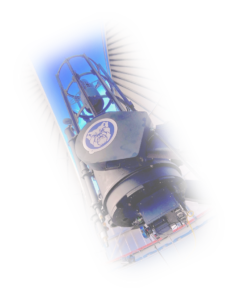
The last four evening of public viewings for this semester are 4/18, 4/19, 4/25, & 4/26. The reservation system is now updated.
Only one show time is being offered at 7:30PM . Doors open at 7PM.
If the initial planetarium show reaches full capacity, we will schedule an additional show for that evening. If you find yourself attending a later show, we’ll streamline the evening for you by initiating telescope viewing right away, ensuring minimal delay during your visit.
*****PLEASE READ BELOW IMPORTANT INFORMATION REGARDING WHEELCHAIR ACCESSIBILITY.
Discover spectroscopy, the science of light, and learn how scientists study the Universe by deciphering clues hidden in light arriving from distant objects. The Cosmic Origins Spectrograph (COS) is an instrument on the Hubble Space Telescope designed to analyze ultraviolet light from very distant, faint objects. COS allows us to learn about the origins of the large scale structure of the Universe, the cold interstellar medium, the formation and evolution of galaxies and the origin of stellar and planetary systems.
The movie will be followed by a star/constellation show highlighting the constellation of Orion and our current evening sky, including where to find the planets in the sky.
Following the planetarium portion of the evening visitors will then have the opportunity to view the current planetary parade through Indiana’s largest telescope, weather permitting. Viewing through the telescope is always free and contingent on good weather.
Tickets are $8 for adults and $5 for children. One show is being offered beginning at 7:30PM . The doors will open at 7PM. Cash and credit are accepted from those arriving without reservations and if there are any available seats. We are excited to welcome you back on campus!
***Please be aware that there may be event parking pricing for $15 per car at Butler due to basketball and shows at Clowes or Schrott. Please check the link above and organize parking off campus if you do not want to be subject to event pricing. Please accept our apologies, parking prices are beyond our control, unfortunately.
If the initial planetarium shows reach full capacity, we will schedule additional shows for that evening. If you find yourself attending a later show, we’ll streamline the evening for you by initiating telescope viewing right away, ensuring minimal delay during your visit.

If the weekend doesn’t align with your schedule, consider scheduling a group tour for your organization or group at a different time.
Holcomb Observatory and Planetarium is conveniently situated on the north end of the Butler University campus. You can reach us by heading west on 46th or 49th Street from Meridian Street (Butler University Campus Map). Parking is available in our parking garage for a fee. Please note that there are three separate sets of steps totaling 66 leading up to the telescope viewing area, as there is no elevator available. For disability-related accommodations, please visit Event Accommodations. Wheelchair accessibility is provided in the lobby and restroom areas temporarily. If you require ground-level viewing, we can arrange for a portable telescope; please contact us in advance to make these arrangements.
Butler University is committed to ensuring its programs, services, activities, and benefits are accessible on an equitable basis to all qualified individuals with disabilities. If you are planning to attend an event at the Holcomb Observatory and feel you may need a disability-related accommodation, please submit this form.
For disability-related accommodation requests, please share your request with two weeks’ advance notice to allow adequate time to make arrangements. Although attempts will be made to honor accommodation requests with less notice, it cannot be guaranteed that a reasonable accommodation can be provided without two-weeks’ notice.
*****Important accessibility note:
While the planetarium area is typically wheelchair accessible, the accessible lift is currently undergoing a replacement and therefore non-operational. Holcomb Observatory is working as quickly as possible to get the new lift up and running. If you are unable to navigate stairs into the planetarium and feel you may need an accommodation on an upcoming visit, please be in touch as soon as possible by completing the above form and contacting holcombobservatory@butler.edu.
In recent years, the planetarium has undergone a substantial $300,000 renovation. We replaced the old analog Spitz AP3 star projector with a state-of-the-art fulldome Digitarium Kappa projector. In late 2022, we further upgraded the planetarium projector to the new laser-phosphor illumination Digitarium Lamda system, offering vivid colors and 225% more pixels on the dome than our previous Kappa projector. This enhancement provides visitors with a fully immersive experience and beautifully renders the night sky. Alongside the new projector, we introduced comfortable theater seating, a 5.1 surround sound system, new carpeting, and cove lighting, all made possible with the support of our corporate partner, Indianapolis-based Bowen Technovation. Additionally, between 2013 and 2015, our large telescope underwent a comprehensive $425,000 refurbishment by Astronomical Consultants and Equipment, thanks to a grant from the Silicon Valley Community Foundation via Frank Levinson, PhD.
*Though you will always see the telescope, its movement, and how it functions, telescope observations are weather dependent.



